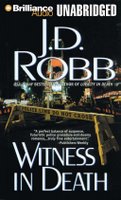 Witness in Death
Witness in Death written by J.D. Robb
read by Susan Ericksen
audiobookPublisher: Brilliance Audio 2007
Original novel published by Berkeley 2000
We return once again to the world of Lt. Eve Dallas the best homicide detective in New York in the year 2059. This time the book starts out as Eve and Roarke are enjoying a play at Roarke's newly built "New Globe Theatre." The play is a stage version of the classic movie "Witness for the Prosecution." Dallas is enjoying the play because she is solving the crime while watching the play. The climactic scene in the play is at the end when the lead actor is stabbed by his wife onstage. The problem is that someone has switched the prop knife for a real one and the actor, Richard Draco, is murdered onstage in front of a couple thousand witnesses including Lt. Eve Dallas. Now Dallas has a homicide to solve.
"Witness in Death" is Book 10 in the "...in Death" series written by Nora Roberts' pseudonym J.D. Robb. It is the 10th book but the 11th story (one story appeared in an anthology) in the series that to date has 27 books (32 stories) in total. The books in this series are some really fun to read sci-fi crime thrillers, and this book is no exception.
While the crime itself took place right in front of Dallas, that doesn't make it cut and dry. After all who switched the prop knife for the real one, when did they do it and why? These are the questions that Eve and her crack team of NYPSD's finest have to solve. This time her team consists of electronics division detectives Feeney and McNabb, her aide, Officer Peabody (who has recently been exploring a love interest with McNabb), Officer Truehart, Dr. Mira - police psychologist, and Roarke (only because Roarke owns pretty much everything on and off planet and loves to dabble in his wife's work).
When it comes to who did it and why, that leads on a confusing trail, because everyone that knew the arrogant Richard Draco hated him and wanted him dead. All of them have a different reason for wanting him dead but it pretty much comes down to Draco being an arrogant jerk. (that's putting it pretty mildly).
When a stage hand is later found dead by hanging, the team rolls into overtime, because the stage hand had just booked a trip to Tahiti so probably didn't kill himself.
If you're wishing to check this book out in audio form, be prepared for a real treat. Susan Ericksen is the reader for all the "...in Death" books and has the vocal characterizations down perfect. My favorite is how she captures the entire character of Peabody in her voice. I'm afraid that if this is ever made into a movie, if they don't cast Holly Hunter as Peabody, I may have a hard time believing the actress. Listen to the audiobook and you'll see what I mean. Each of the character's voices created by Ms. Erickson are unique and you may feel you are hearing a multi-cast performance.
 Doctor Who – The Evil of The Daleks
Doctor Who – The Evil of The Daleks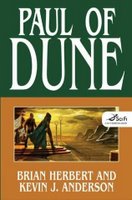 Paul of Dune by Brian Herbert& Kevin J. Anderson (2008)
Paul of Dune by Brian Herbert& Kevin J. Anderson (2008)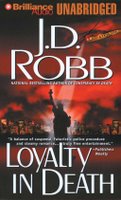 Once again we join New York's best homicide detective in the year 2059, this time it's not really a real homicide case that Lt. Eve Dallas is thrust into. Sure, there are dead bodies and a murder mystery for this kick-butt future cop to solve but this time a lot more is at stake and the culprits are terrorists.
Once again we join New York's best homicide detective in the year 2059, this time it's not really a real homicide case that Lt. Eve Dallas is thrust into. Sure, there are dead bodies and a murder mystery for this kick-butt future cop to solve but this time a lot more is at stake and the culprits are terrorists. 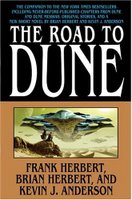 Any true science-fiction fan can tell you that one of the classics of Sci-Fi is the Dune Series created by Frank Herbert. If you have taken it upon yourself to read the entire series you'll remember that Frank Herbert died and left the series a real cliffhanger. Some dedicated dune fans will say that is what he intended but some will say he had more to write. Frank Herbert's son, Brian has teamed up with another sci-fi author, Kevin J. Anderson and working with Franks notes and stored treasures left behined have brought the Dune series to a close. They have also augmented the series with some great prequels also using ideas they found in Frank Herbert's many writings, and to this day they are adding more stories and books to the Duneverse with the recent publication of "Paul of Dune." (note: I'll be reviewing this book soon...I have the audiobook sitting on my shelf waiting for my devouring.
Any true science-fiction fan can tell you that one of the classics of Sci-Fi is the Dune Series created by Frank Herbert. If you have taken it upon yourself to read the entire series you'll remember that Frank Herbert died and left the series a real cliffhanger. Some dedicated dune fans will say that is what he intended but some will say he had more to write. Frank Herbert's son, Brian has teamed up with another sci-fi author, Kevin J. Anderson and working with Franks notes and stored treasures left behined have brought the Dune series to a close. They have also augmented the series with some great prequels also using ideas they found in Frank Herbert's many writings, and to this day they are adding more stories and books to the Duneverse with the recent publication of "Paul of Dune." (note: I'll be reviewing this book soon...I have the audiobook sitting on my shelf waiting for my devouring.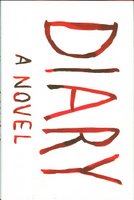 I'm not sure what I really expected out of this book, but I got a really good read, that much is certain. Many people know Chuck Palahniuk as the author of "Fight Club" and "Choke" and expect some really interesting social commentary and this book provides more views of society through the cynical eyes of Chuck Palahniuk. Keep in mind though, he has also written some good horror like "Lullaby" and "Haunted." When he does write the horror it also contains some social commentary/satire, and this book contains all that with what starts out as in interesting view of society through the eyes of a failed artist to a horror novel of a woman held hostage by a community.
I'm not sure what I really expected out of this book, but I got a really good read, that much is certain. Many people know Chuck Palahniuk as the author of "Fight Club" and "Choke" and expect some really interesting social commentary and this book provides more views of society through the cynical eyes of Chuck Palahniuk. Keep in mind though, he has also written some good horror like "Lullaby" and "Haunted." When he does write the horror it also contains some social commentary/satire, and this book contains all that with what starts out as in interesting view of society through the eyes of a failed artist to a horror novel of a woman held hostage by a community.